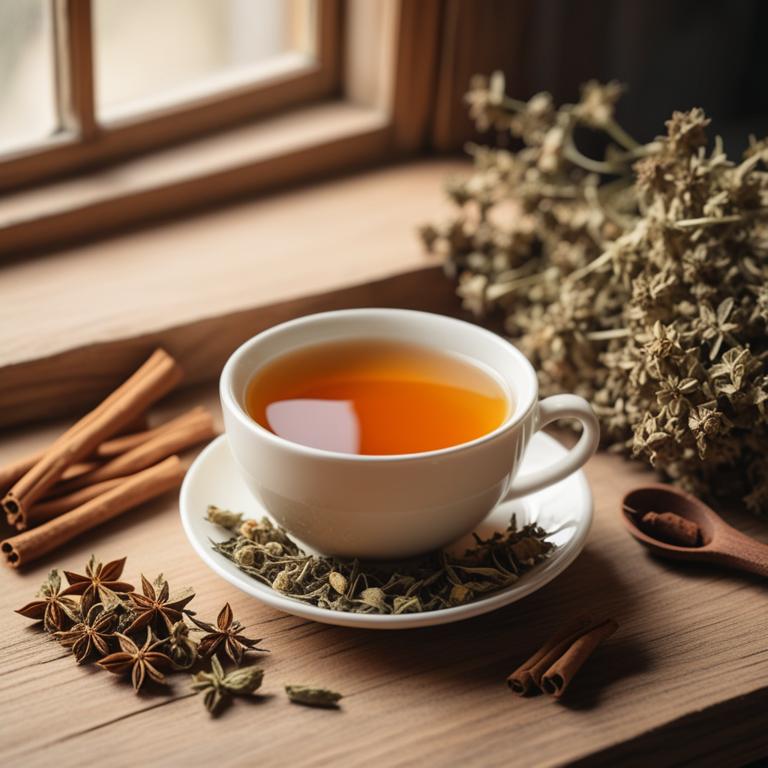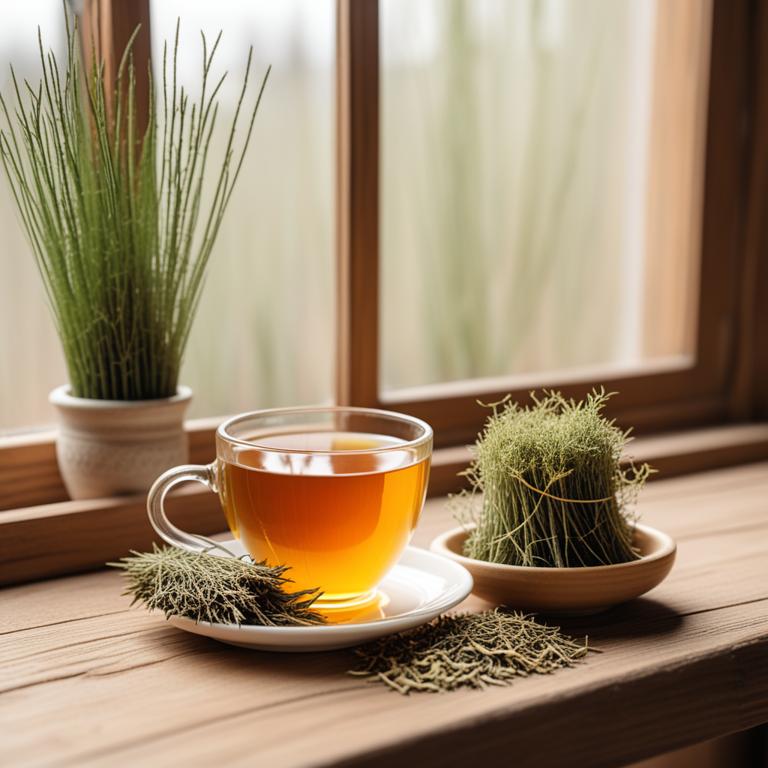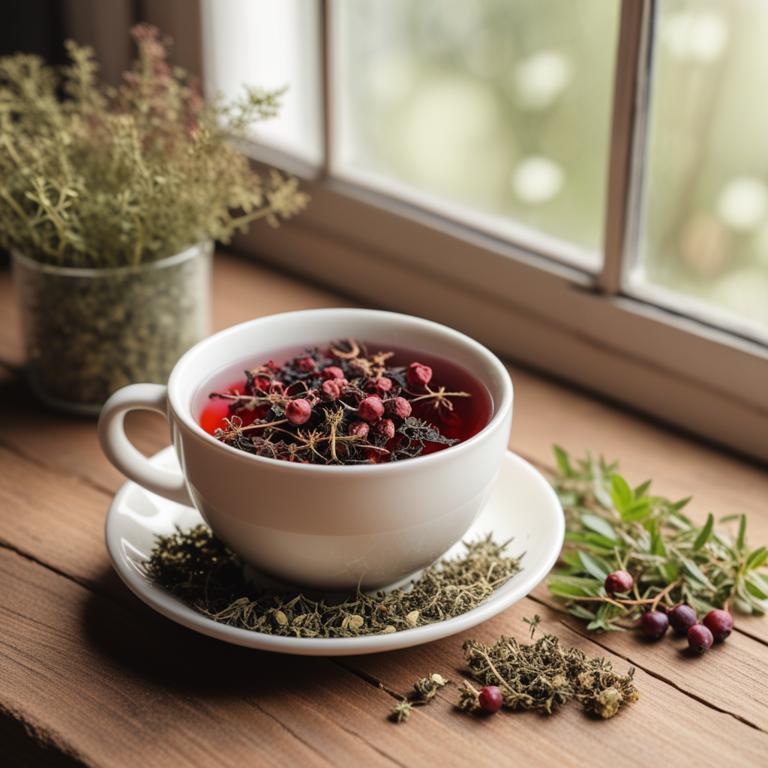7 Best Herbal Teas For Bladder Pain

Herbal teas for Bladder pain are a natural remedy used to alleviate the discomfort and irritation associated with interstitial cystitis (IC) or overactive bladder (OAB).
These herbal teas can be effective in treating bladder pain due to their anti-inflammatory and antispasmodic properties, which help to reduce inflammation and calm the muscles in the bladder.
Some examples of herbal teas that can be used to treat bladder pain include peppermint tea, which helps to relax the muscles and reduce inflammation; ginger tea, which has anti-inflammatory properties that can help to soothe the bladder; chamomile tea, which has a calming effect on the body and can help to reduce stress and anxiety; and cranberry tea, which may help to prevent urinary tract infections (UTIs) that can contribute to bladder pain.
Other herbal teas that may be beneficial for bladder pain include dandelion root tea, which can help to reduce inflammation and improve digestion; juniper berry tea, which has antispasmodic properties that can help to relax the muscles in the bladder; and uva ursi tea, which has antibacterial properties that can help to prevent UTIs.
Related Study
According to the study, teas for bladder pain using medicinal plants may provide a potential alternative therapy with high efficacy and safety for treating overactive bladder (OAB) symptoms.
Below there's a list of the 7 best herbal teas for bladder pain.
Table of Contents
Also, you may be interested in...
Today Free Bonus!
The Ultimate Herb Drying Checklist
(For Long-Lasting Powerful Medicinal Effect)
How to easily dry herbs that don't mold and that keep their strong medicinal power for more than 1 year.
1. Glycyrrhiza glabra teas

Glycyrrhiza glabra teas, a herbal preparation derived from the licorice plant, have been traditionally used to treat bladder pain, particularly interstitial cystitis.
The properties of this herbal preparation that help to treat this ailment include its anti-inflammatory and antioxidant properties, which help to soothe the bladder and reduce inflammation.
Glycyrrhiza glabra teas contain bioactive constituents such as glycyrrhizin, flavonoids, and saponins, which have been shown to inhibit the growth of pathogenic bacteria and reduce oxidative stress in the bladder.
The benefits of this herbal preparation to treat bladder pain include improved bladder function, reduced pain and discomfort, and enhanced overall well-being, making it a popular natural remedy for individuals suffering from this condition.
Recipe:
- Gather 1 cup of water, 1 tablespoon of dried Glycyrrhiza glabra roots, and a tea infuser.
- Heat the water until it boils. Then, reduce the heat to low.
- Add the dried Glycyrrhiza glabra roots to the tea infuser and place it in the water.
- Steep the roots for 5-7 minutes. Strain the tea into a cup.
- Drink the tea while it's warm. Repeat as needed, but consult a doctor first.
Glycyrrhiza glabra teas can be used to treat bladder pain, but they may cause side effects such as increased blood pressure, low potassium levels, and changes in the body's ability to respond to stress, particularly in individuals who consume high amounts for an extended period.
Precautions to take when using these teas include monitoring blood pressure and potassium levels, avoiding excessive consumption, and being aware of potential interactions with other medications that may exacerbate these effects.
Glycyrrhiza Glabra Tea on Amazon
Pukka Herbal Teas Licorice and Cinnamon - 20 Bags, 20 Count
Disclaimer: We earn a commission if you click this link and make a purchase at no additional cost to you.
2. Taraxacum officinale teas

Taraxacum officinale teas, also known as dandelion tea, have been traditionally used to treat bladder pain and other urinary issues due to their diuretic and anti-inflammatory properties.
The herbal preparation helps to treat bladder pain by increasing urine production, reducing inflammation in the urinary tract, and promoting the elimination of toxins.
The bioactive constituents of Taraxacum officinale teas, including flavonoids, terpenoids, and phenolic acids, contribute to their therapeutic effects by modulating the immune response, antioxidant activities, and inhibiting the growth of pathogenic microorganisms.
The benefits of using Taraxacum officinale teas to treat bladder pain include reduced symptoms, improved overall urinary health, and a natural alternative to pharmaceutical treatments.
Recipe:
- Gather 1 cup of fresh Taraxacum officinale leaves and flowers.
- Chop the leaves and flowers into small pieces and fill a 1-liter pot with 4 cups of water.
- Add the chopped Taraxacum officinale to the pot and bring the water to a boil.
- Reduce heat to low and let it simmer for 5-7 minutes. Strain the tea and discard the solids.
- Add 1 tablespoon of honey (optional) to the tea and drink 2-3 cups throughout the day to help alleviate bladder pain.
Taraxacum officinale teas can be used as a potential treatment for bladder pain, but it may cause side effects such as increased urination frequency, mild stomach upset, and allergic reactions in some individuals.
Precautions when using Taraxacum officinale teas for this purpose include being cautious of interactions with other medications, avoiding use during pregnancy and breastfeeding, and monitoring blood pressure levels due to potential hypertensive effects.
Taraxacum Officinale Tea on Amazon
Teeccino Dandelion Coconut Tea - Caffeine Free, Roasted Herbal Tea with Prebiotics, 3x More Herbs than Regular Tea Bags, Gluten Free - 25 Tea Bags
Disclaimer: We earn a commission if you click this link and make a purchase at no additional cost to you.
3. Equisetum arvense teas

Equisetum arvense teas, also known as horsetail tea, have been traditionally used to treat bladder pain ailments such as interstitial cystitis.
The anti-inflammatory properties of this herbal preparation help to reduce inflammation and soothe the bladder, providing relief from the painful symptoms.
The bioactive constituents, including flavonoids, alkaloids, and saponins, work together to help heal the bladder lining and reduce oxidative stress.
The benefits of Equisetum arvense teas in treating bladder pain include reduced inflammation, improved bladder function, and a decrease in pain and discomfort, making it a popular natural remedy for this condition.
Recipe:
- Gather 1 cup of fresh or dried Equisetum arvense (horsetail) roots or stems.
- Wash the Equisetum arvense in cold water to remove dirt and impurities.
- Combine 1 tablespoon of Equisetum arvense with 1 cup of boiling water in a pot.
- Steep the mixture for 5-7 minutes, then strain the liquid into a cup.
- Drink 1/2 to 1 cup of the Equisetum arvense tea 2-3 times a day to relieve bladder pain.
Equisetum arvense teas can be used to treat bladder pain, but possible side effects may include stomach upset, nausea, and dizziness, as well as interactions with other medications due to its high silica content.
Precautions include using it in moderation and avoiding it if you have kidney problems, are pregnant, or have a history of bleeding disorders, as it may exacerbate these conditions.
4. Hypericum perforatum teas

Hypericum perforatum teas, also known as St. John's Wort, have been traditionally used to treat bladder pain, specifically urethritis, due to their anti-inflammatory and antiseptic properties.
The bioactive constituents of Hypericum perforatum, including flavonoids, phenolic acids, and terpenoids, help to reduce inflammation and combat bacterial infections that cause the pain.
By reducing the inflammation and bacterial load, Hypericum perforatum teas alleviate the symptoms of bladder pain and promote healing.
The benefits of using Hypericum perforatum teas to treat bladder pain include their ability to reduce pain, inflammation, and oxidative stress, making them a potential natural remedy for this ailment.
Recipe:
- Gather 1 cup of fresh Hypericum perforatum leaves and flowers, or 1 teaspoon of dried Hypericum perforatum.
- Use a strainer or cheesecloth to rinse the Hypericum perforatum leaves and flowers in cold water.
- Combine 1 cup of boiling water with the rinsed Hypericum perforatum in a heat-resistant cup or teapot.
- Let the mixture steep for 5-7 minutes, then strain the liquid using a strainer or cheesecloth into another cup.
- Drink 1/2 cup of the tea 2-3 times a day for bladder pain relief.
Hypericum perforatum teas can be used to treat bladder pain, but possible side effects may include dizziness, dry mouth, and stomach upset in some individuals.
Precautions when using Hypericum perforatum teas for this purpose include being cautious with high doses, as they may interact with other medications and exacerbate underlying conditions such as bleeding disorders, and also being mindful of potential allergic reactions or interactions with other herbal preparations.
Hypericum Perforatum Tea on Amazon
Horbäach St Johns Wort Tincture | 2 Fl Oz | Alcohol Free | Vegetarian Liquid Extract | Non-GMO, Gluten Free Supplement
Disclaimer: We earn a commission if you click this link and make a purchase at no additional cost to you.
5. Cinchona officinalis teas

Cinchona officinalis teas have been traditionally used to treat the bladder pain ailment, specifically for its anti-inflammatory and antimicrobial properties, which help to reduce inflammation and combat infections that cause the pain.
The bioactive constituents of Cinchona officinalis, including quinine, quinidine, and cinchonine, contribute to its therapeutic effects by modulating the immune response and reducing oxidative stress.
By reducing inflammation and combating infections, Cinchona officinalis teas help to alleviate the pain and discomfort associated with bladder infections, providing relief and improving the overall quality of life for those affected.
The benefits of using Cinchona officinalis teas to treat bladder pain include their natural, non-invasive approach, minimal side effects, and potential long-term relief from symptoms.
Recipe:
- Gather 1 teaspoon of dried Cinchona officinalis bark and a cup of boiling water.
- Place the bark in a cup or teapot and pour in the boiling water.
- Let the mixture steep for 5-10 minutes to allow the bark to release its properties.
- Strain the liquid using a fine-mesh sieve or cheesecloth to remove the bark particles.
- Drink the tea warm or at room temperature, up to 3 times a day to help alleviate bladder pain.
Cinchona officinalis teas can be used to treat bladder pain ailments, but possible side effects may include gastrointestinal upset, allergic reactions, and interactions with other medications, such as blood thinners, which may lead to increased bleeding risk.
Precautions when using Cinchona officinalis teas include avoiding excessive consumption, as it may cause dizziness, and monitoring blood pressure, as it may have a blood pressure-lowering effect.
Cinchona Officinalis Tea on Amazon
Quina Roja(chinona) & Palo de Víbora Tea – 100% Natural, Vegan, Hecho en México | 25 Tea Bags
Disclaimer: We earn a commission if you click this link and make a purchase at no additional cost to you.
6. Vaccinium macrocarpon teas

Vaccinium macrocarpon teas, also known as cranberry teas, have been traditionally used to treat bladder pain and other urinary tract issues.
The anti-inflammatory and antimicrobial properties of this herbal preparation help to reduce pain and inflammation in the bladder, while also preventing the growth of harmful bacteria that can cause infections.
The bioactive constituents of Vaccinium macrocarpon teas, including proanthocyanidins and anthocyanins, have been shown to help prevent the adhesion of bacteria to the bladder walls, thereby reducing the risk of infection and pain.
By drinking Vaccinium macrocarpon teas, individuals can benefit from reduced bladder pain, fewer urinary tract infections, and a lower risk of developing chronic conditions such as interstitial cystitis.
Recipe:
- Gather 1 cup of dried Vaccinium macrocarpon berries and 2 cups of water
- Add 1 tablespoon of dried berries to a tea infuser or a heat-resistant cup
- Pour 2 cups of boiling water over the berries and let it steep for 5-7 minutes
- Strain the tea through a fine-mesh sieve into a cup and discard the solids
- Drink 1/2 to 1 cup of the tea, 2-3 times a day, to help alleviate bladder pain
Vaccinium macrocarpon teas can be used to treat bladder pain due to its anti-inflammatory and antioxidant properties, but possible side effects may include gastrointestinal issues such as nausea, diarrhea, and stomach cramps in some individuals.
To use Vaccinium macrocarpon teas safely, it is recommended to start with a small dose and gradually increase it, avoid consuming it with other medications or herbal preparations, and be cautious when using it for extended periods, as it may lead to kidney damage or interact with certain health conditions.
7. Sambucus nigra teas

Sambucus nigra teas have been traditionally used to treat bladder pain, also known as interstitial cystitis, due to their anti-inflammatory and antispasmodic properties.
The herbal preparation helps to treat this ailment by reducing inflammation and relaxing the bladder muscles, providing relief from pain and discomfort.
The bioactive constituents of Sambucus nigra teas, including flavonoids, phenolic acids, and anthraquinones, contribute to their therapeutic effects by reducing oxidative stress and modulating the immune response.
The benefits of Sambucus nigra teas in treating bladder pain include reduced symptoms, improved quality of life, and a potential decrease in the need for pharmaceutical interventions.
Recipe:
- Gather Sambucus nigra flowers, dried or fresh. Use 1 cup of flowers.
- Boil 1 cup of water in a pot. Remove from heat.
- Add 1 cup of Sambucus nigra flowers to the hot water. Let it steep for 5-10 minutes.
- Strain the tea into a cup. Discard the flowers.
- Drink the tea 2-3 times a day for bladder pain relief.
Sambucus nigra teas can be used as a potential remedy for bladder pain, but may cause side effects such as allergic reactions, nausea, and diarrhea in some individuals.
When using Sambucus nigra teas to treat bladder pain, it's essential to be cautious and avoid taking large doses, as this can lead to interactions with other medications or worsen underlying conditions such as kidney disease, and to also be aware of potential interactions with certain medications like blood thinners.
Sambucus Nigra Tea on Amazon
Elderberry Turmeric Ginger Tea - Made in USA
Disclaimer: We earn a commission if you click this link and make a purchase at no additional cost to you.